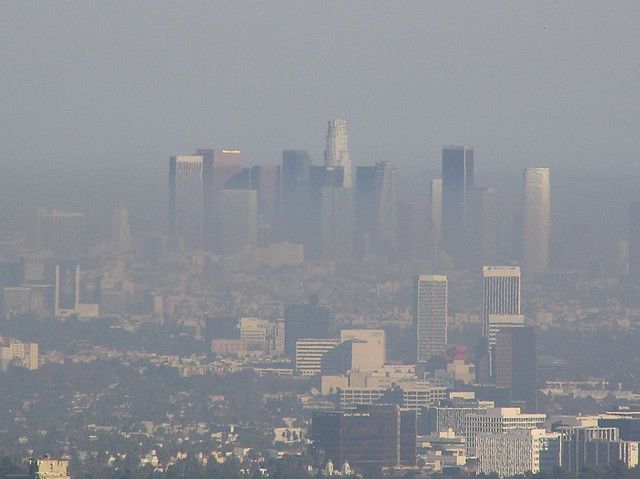Climate policy expansion clears biggest legislative hurdle
by Matt Fleming | August 23, 2016 3:24 pm
 An extension and expansion of one of the state’s landmark environmental laws cleared the Assembly on Tuesday — all but guaranteeing the bill’s ultimate passage.
An extension and expansion of one of the state’s landmark environmental laws cleared the Assembly on Tuesday — all but guaranteeing the bill’s ultimate passage.
Senate Bill 32 would require the Air Resources Board to ensure that greenhouse gas emissions in the state are reduced at least 40 percent below 1990 levels by 2030. Essentially, the bill builds on its predecessor, AB32, which required the ARB to achieve 1990 levels by 2020.
To achieve these goals, the measure would continue to give the ARB the authority to create and implement regulations with blanket legislative approval, which has been one of the main critiques of the current program.
The most controversial measure taken by the ARB thus far has been the state’s cap and trade auction program, which a pending lawsuit argues imposed an illegally-passed tax on businesses.
While the Assembly was voting on SB32, the ARB released the results of the most recent cap and trade auction, which missed its target again by selling around[1] one-third of the available emission credits.
State of play
One slight legislative hurdle still in SB32’s way is a provision that it’s only effective if another measure, AB197, becomes law as well. This companion bill would create a legislative policy committee to oversee the ARB and adds two legislators as non-voting members of the board.
AB197 cleared the Senate on Monday and heads back to the Assembly for a concurring vote. Like SB32, its toughest test is behind it, although it’s still vulnerable in the Assembly — and opponents know it.
The climate battle isn't over yet — oil companies are trying to target #AB197[2], which is tied to #SB32[3]. @melmason[4]: https://t.co/I5A2ofmoTC[5]
— Chris Megerian (@ChrisMegerian) August 23, 2016[6]
On Tuesday, legislators argued the pros and cons of the measure, largely along party lines. Republican Assemblyman James Gallagher of Nicolaus argued that the state’s environmental policies have hurt businesses and job creation, particularly in the oil and gas sector and among truckers.
Questionable process
Assemblyman David Hadley, a Torrance Republican, decried the bill as a gut-and-amend that hadn’t been fully debated in a policy committee.
“Observe the basic procedural tenets,” Hadley said.
Gut and amend is a procedural maneuver used to circumvent the normal legislative[7] process that’s especially popular during the end of session. A measure to be considered by voters[8] in November would curb the most egregious abuses of gut and amend.
Toxic air
Proponents largely made arguments that passing SB32 was the right thing to do. Assemblyman Jimmy Gomez, D-Los Angeles, complained about growing up in Riverside and often being unable to see Big Bear just mere miles away through the smog, or not being able to play outside as a result of negative quality warnings.
A recent report suggested[9] that the greater Los Angeles area has the most toxic air in the nation, causing around 1,341 deaths annually.
Accountability
Speaker Anthony Rendon talked up the increased accountability measures in AB197.
“With SB32, we continue California’s leadership on climate change, we keep making sure our air gets cleaner, and we ensure the economic and environmental benefits of our efforts reach all California communities,” the Paramount Democrat said after the vote. “To ensure those goals are achieved, we must also pass AB197 to ensure greater legislative oversight, as well as agency accountability and data transparency from the California Air Resources Board.”
The levels
For what it’s worth, total GHG emissions in 2014 (the most recent data) were 441.5 million metric tons of carbon-dioxide equivalent, and the target by 2020 is 431 MMTCO2e.
In 2007, around AB32’s passage, greenhouse gas inventory reached 479.74 MMTCO2e. This is according to data provided by the ARB.
- selling around: http://www.arb.ca.gov/cc/capandtrade/auction/aug-2016/summary_results_report.pdf
- #AB197: https://twitter.com/hashtag/AB197?src=hash
- #SB32: https://twitter.com/hashtag/SB32?src=hash
- @melmason: https://twitter.com/melmason
- https://t.co/I5A2ofmoTC: https://t.co/I5A2ofmoTC
- August 23, 2016: https://twitter.com/ChrisMegerian/status/768164031098068992
- circumvent the normal legislative: http://calwatchdog.com/2016/08/09/gut-amend-going-nowhere-assembly-speaker-says/
- A measure to be considered by voters: http://calwatchdog.com/2016/05/05/transparency-measure-appears-headed-ballot/
- recent report suggested: http://www.ocregister.com/articles/air-725392-pollution-health.html
Source URL: https://calwatchdog.com/2016/08/23/climate-policy-expansion-clears-biggest-legislative-hurdle/